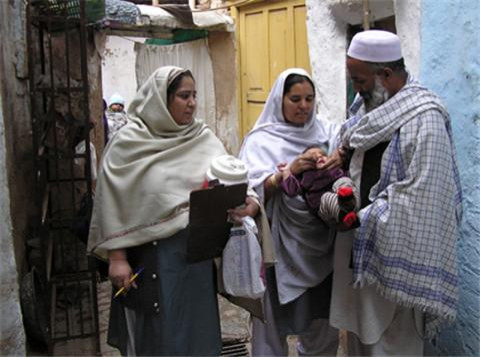240,000 Pakistani Children At Risk For Polio

Two-hundred and forty-thousand Pakistani children living in North and South Waziristan, regions known for enduring almost-constant U.S. drone strikes, have missed their scheduled U.N.-sponsored polio vaccinations because of security concerns, the World Health Organization said on Friday.
In December 2012, 15 anti-polio campaign workers were killed by militant groups who accused them of being spies for the U.S.
The polio vaccine was developed in the early 1950s in the U.S., and the disease has been all but eradicated in most developed countries; incidences of the virus have dropped 99 percent since 1988. However, in Pakistan, along with Afghanistan and Nigeria, the disease is still endemic, the WHO said, and the virus is contagious.
“Failure to eradicate polio from these last remaining strongholds could result in as many as 200,000 new cases every year, within 10 years, all over the world,” the WHO said. The children have not been immunized since July 2012, Dr. Nima Saeed Abid told the Associated Press.
Dr. Abid told AP there have been five polio cases reported in Pakistan in 2013 already, although most incidents of the virus are concentrated in just a handful of provinces. Nearly 200 cases of polio in Pakistan were reported in 2011, and 58 were reported in 2012.
However, the militant's accusations that health workers are actually spying for the U.S. government is not entirely unfounded.
In June 2012, a little more than a year after former al Qaeda leader Osama bin Laden was found hiding in the city of Abbottabad, outside Islamabad, Dr. Shajuk Afridi, a Pakistani doctor who had set up a hepatitis-B vaccine program in the region, was arrested for colluding with the United States. It turned that not only did he have a shady past (including charges of medical malpractice), but he was recruited by the CIA to set up the campaign as a cover to get into bin Laden’s compound.
Afridi is now serving 33 years in jail.
In January, Pakistan Foreign Minister Hina Rabbani Khar told the Council on Foreign Relations in New York that there was no doubt that Afridi was anything but a criminal.
"He is no hero," Khar said, referring to the way the American media portrayed the doctor when he was arrested. Khar said that Afridi's actions left millions of Pakistani children at risk for diseases like hepatitis and polio.
"To me, he's a villain. He did not know what he was doing," Khar said. "He is just a man with a long history of being up for hire both by terrorist organizations and by any other intelligence organization who so desires. He did not know who he was working for or what he was doing."
© Copyright IBTimes 2024. All rights reserved.






















